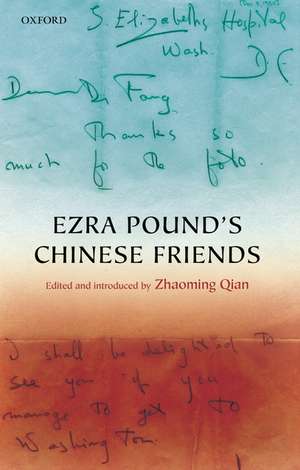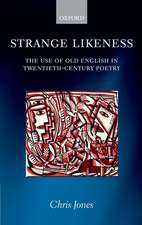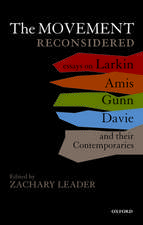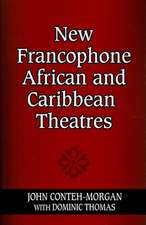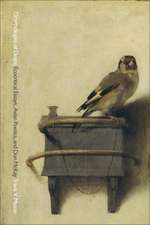Ezra Pound's Chinese Friends: Stories in Letters
Editat de Zhaoming Qianen Limba Engleză Hardback – 20 feb 2008
Preț: 330.60 lei
Preț vechi: 403.58 lei
-18% Nou
Puncte Express: 496
Preț estimativ în valută:
63.27€ • 65.65$ • 52.88£
63.27€ • 65.65$ • 52.88£
Carte tipărită la comandă
Livrare economică 04-10 martie
Preluare comenzi: 021 569.72.76
Specificații
ISBN-13: 9780199238606
ISBN-10: 019923860X
Pagini: 272
Ilustrații: 30 black-and-white halftones
Dimensiuni: 162 x 242 x 18 mm
Greutate: 0.61 kg
Editura: OUP OXFORD
Colecția OUP Oxford
Locul publicării:Oxford, United Kingdom
ISBN-10: 019923860X
Pagini: 272
Ilustrații: 30 black-and-white halftones
Dimensiuni: 162 x 242 x 18 mm
Greutate: 0.61 kg
Editura: OUP OXFORD
Colecția OUP Oxford
Locul publicării:Oxford, United Kingdom
Recenzii
Zhaoming Qian has brought to the foreground not ony an essential source for Pound's oriental thinking but a necessary chapter in cross-cultural endeacour.
162 letters were tracked down over 15 years by Professor Zhaoming Qian of the University of New Orleans. "For a long time people were wary of writing about Pound because of his fascist beliefs. From these letters we can see he realised his mistakes."
A timely addition to any library already invested in Pound's correspondence.
Qian's book helps to deliver new and subtler understandings of Pound's postwar writings by showing us quite how serious were Pound's studies of China and Confucianism
This is an important collection of mostly unknown letters, expertly presented. Taken together they reveal the depth and the development of Pound's engagement with the Confucian tradition of China, and with its language, beginning in 1914 and intensifying through the following five decades. The book will be welcomed by Pound scholars and students, and more broadly by anyone concerned with cultural exchanges between China and the West.
Ezra Pound's Chinese Friends fills out our understanding of Pound's fascination with China and Japan through original documents. It reveals glimpses of this opinionated, questing man in dialogue with people he respected (not a frequent situation in Pound's correspondence). Chiefly it shows one of the major Modernists in his time of isolation, trying to 'make it new' by engagement with an unfamiliar language and culture.
162 letters were tracked down over 15 years by Professor Zhaoming Qian of the University of New Orleans. "For a long time people were wary of writing about Pound because of his fascist beliefs. From these letters we can see he realised his mistakes."
A timely addition to any library already invested in Pound's correspondence.
Qian's book helps to deliver new and subtler understandings of Pound's postwar writings by showing us quite how serious were Pound's studies of China and Confucianism
This is an important collection of mostly unknown letters, expertly presented. Taken together they reveal the depth and the development of Pound's engagement with the Confucian tradition of China, and with its language, beginning in 1914 and intensifying through the following five decades. The book will be welcomed by Pound scholars and students, and more broadly by anyone concerned with cultural exchanges between China and the West.
Ezra Pound's Chinese Friends fills out our understanding of Pound's fascination with China and Japan through original documents. It reveals glimpses of this opinionated, questing man in dialogue with people he respected (not a frequent situation in Pound's correspondence). Chiefly it shows one of the major Modernists in his time of isolation, trying to 'make it new' by engagement with an unfamiliar language and culture.
Notă biografică
As University Research Professor of English at the University of New Orleans, Zhaoming Qian's teaching and research areas focus on East/West comparative poetics, Orientalism, transpacific interculturality, and interdisciplinary Modernism. Qian's books include Orientalism and Modernism: The Legacy of China in Pound and Williams (1995), The Modernist Response to Chinese Art: Pound, Moore, Stevens (2003), and Ezra Pound and China (2003). His research has been supported by fellowships from the National Endowment for the Humanities, the American Philosophical Society, and Yale University.
